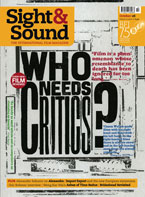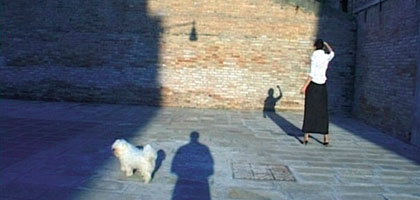
NOZONE: Heavenly creatures
DVD Review: The Garden of Earthly Delights

Polish director Lech Majewski uses modest means and big ideas to create a camcorder masterpiece, writes Tim Lucas
The Garden of Earthly Delights
Lech Majewski; Poland/UK 2004; Kino on Video/Region 0 NTSC; 104 minutes; Aspect Ratio 1.85:1; Features: director's commentary, stills gallery, Majewski biography
The Handycam has produced its first masterpiece. Shot entirely on a single Sony PD100 camera, held at different times by the director or one of its two principals, The Garden of Earthly Delights is a kind of triptych, much like the 1503 Hieronymous Bosch painting (subtitled 'The Millennium') from which it takes its name.
Set in the year 2000, at the beginning of our own millennium, it is firstly the camcorder diary of an intense love affair that blossoms between art historian Claudine Cossan (Claudine Spiteri) and naval engineer Chris Martin (Chris Nightingale) after Claudine delivers a mesmerising National Gallery lecture on Bosch's masterwork. Secondly, it is the film about Bosch's painting that the lovers decide to make in collaboration after taking an apartment in Venice, a project that becomes Claudine's last hope for a legacy when she is diagnosed with terminal throat cancer. Finally, it is their video recreation of the masterpiece, as Chris - who has been studying asymmetrical gondola design as part of his own PhD project entitled 'The Principle of Coordinated Proportions of Hull Displacement in New Generation Container Vessels' - begins to devote all his attentions to refashioning their apartment space into likenesses of details from the painting's central panel in which humanity, poised between heaven and hell, finds the freedom to create paradise on earth, a freedom that makes them, in Claudine's words, equal to God. These onion layers unreel out of sequence as a grieving Chris loads tape after tape into his VCR, his random searchings of their shared past becoming the film they intended to make. It is left to the attentive viewer to sort out the order in which the various scenes were shot by noting the presence of cars (thus London, not Venice), when Claudine is and isn't wearing the white neck bandage from her biopsy, the tenderness in Chris' voice, and the degraded quality of various shots as Chris documents his own later study of the original recordings.
It's another 'Death in Venice' story, yes, but here the location roots the vital interests of the couple in outward reality, the worlds of water and Renaissance art, rather than the morbid sinking of all concerned. Thus the film achieves a powerful sense that life really is what we make it, just as the exploratory and creative nature of this romance shows that every new relationship is a gift of open possibilities. By the same token, it reminds us that, as long as death exists, our exile from Eden is ever ongoing.
I can think of no film since the death of Kieslowski that so masterfully encompasses so much of the faceted concreteness of life, as well as its dimensions of spiritual mystery. Despite its modest cinematographic means, the photography is often lovely and it permits extraordinary depths of intimacy to be tapped between the actors, both of whom give rich and utterly believable performances. The film's greatest accomplishment is the warmth and humanity projected by this academic couple's restless exchange of ideas, questions and answers pertaining to art, science, history and, finally, life and death. Their dialogue about symmetry, gondola construction, population growth, the chemical components of the human body and the significance of buried details in Renaissance art is teeming with epiphanies. Claudine's ceaseless intellectual curiosity in particular gradually turns to a despairing, open-eyed desire to better comprehend the factors behind the accident of life and the inevitability of death as it approaches. When Chris calms Claudine's anguish by assembling an exhibit of the chemical components to which all human matter breaks down, in their exact measurements, it's a highly unusual but, in context, magnanimously loving gesture; it's hard to imagine another actor selling the scene so well as Nightingale does. But it is Spiteri (in a role originally offered to Katrin Cartlidge, who reportedly accepted with great enthusiasm, worked with Majewski for a few months, then abruptly withdrew a short time before her own unexpected death at 41) who steals the film as the focus of Chris' camera; her performance packs a tremendous human range - formal and businesslike, intellectual and inspired, coquettish and sexual, frightened and childlike - that should leave no one unmoved.
This remarkable film was based on Majewski's own novel Metaphysics (a 33-page sample is available at www.lechmajewski.com) which, as he explains in the commentary, tells the story in epistolary form, with Chris writing to Claudine after she has died to perpetuate her memory. In the novel, she's dead from the beginning and the storytelling is more linear, whereas here it is torn up, much as Chris tears apart a photograph of Claudine in the film's first hint of the tragedy to follow (the revelation of her illness is postponed until nearly the halfway point), its ultimate structure found through the healing process of forging a work of art.
The Garden of Earthy Delights is one of four Lech Majewski films being issued by Kino, the others being Gospel According to Harry (1994, with Viggo Mortensen), The Roe's Room (1994) and Glass Lips (2007). I have them all in hand but was so astonished by this one, I'm still absorbing it and not quite ready to move on.
